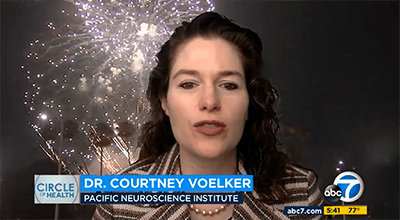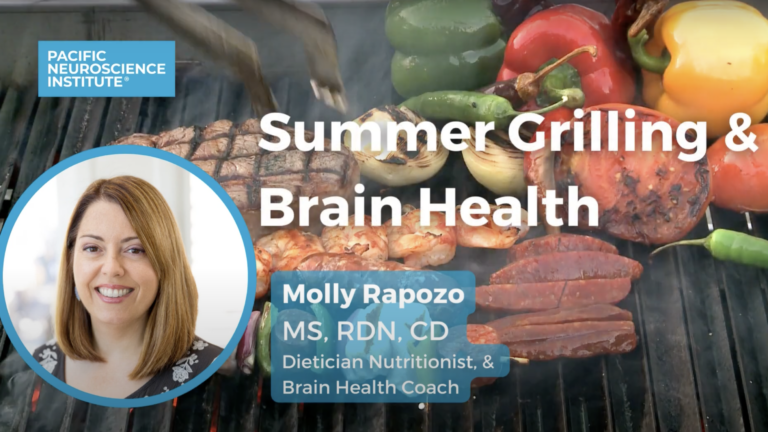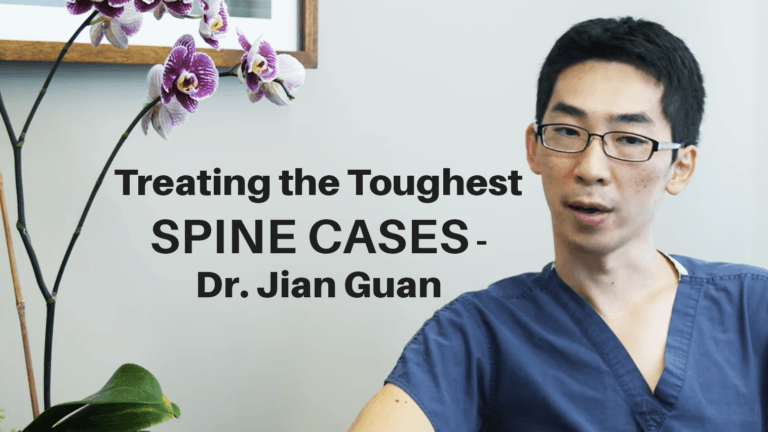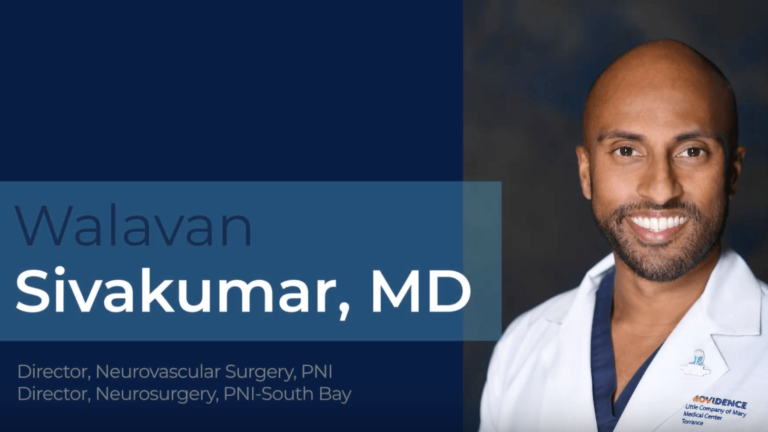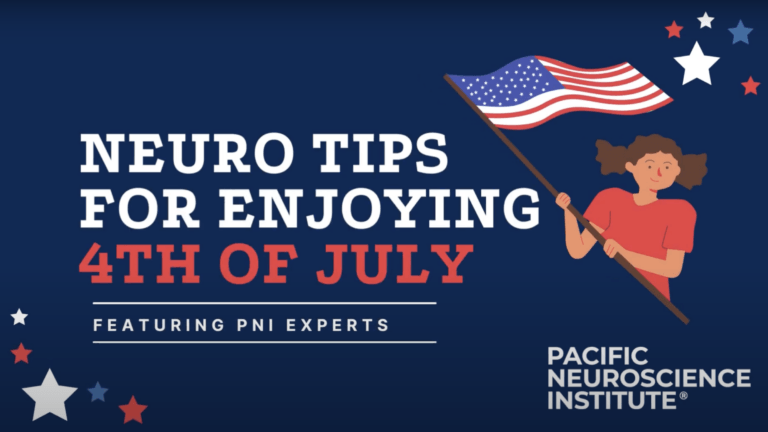
Brain Health Tips for 4th of July
by PNI Experts
Celebrate 4th of July with brain health tips from Pacific Neuroscience Institute® (PNI) experts. Learn how to protect your brain and spine health when watching fireworks, enjoy foods cooked on the grill, and avoid undue stress if you or a loved one has a neurodegenerative condition.
1. Avoid spine & brain strain when watching fireworks

Fireworks are a fun part of every 4th of July, but neck pain can make enjoying the spectacle tough, especially if you have to look up (“extend your neck”) for the entire show, explained, Jian Guan, MD, a fellowship-trained neurosurgeon with a special focus on complex spine surgery at Pacific Neuroscience Institute.
The human head on average weighs 10-11 pounds, and keeping it supported is a full-time job for your neck, Dr. Guan said. One great way to keep neck pain from ruining your 4th is to make neck stretches a part of your routine.
Try incorporating Dr. Guan’s three neck stretches into your routine:
- Stretch 1: Start by positioning your head squarely over your shoulders, looking straight ahead, and ensuring your back is straight throughout the stretch. From this position, gently lower your chin towards your chest as far as you can comfortably without causing yourself discomfort. Hold this position for 5 seconds and then gently return to your starting position.
- Stretch 2: From the starting position, gently move your head backward to look towards the ceiling as far as you can comfortably without causing yourself discomfort. Hold this position for 5 seconds and then gently return to your starting position. Repeat this stretch 10 times.
- Stretch 3: Next, from the starting position once again, rotate your head gently towards your left side until you feel a gentle stretching in the muscles on the right side of your neck. Hold this position for 10 seconds and then return to the starting position. Repeat this maneuver, except this time towards your right side. Perform this set of stretches 10 times.
FAQ: Can I watch fireworks if I have a brain tumor?
Brain tumor patients can safely watch fireworks by being mindful of where they are in the treatment course when enjoying them, explained Walavan Sivakumar, MD, Director of Neurosurgery at PNI-South Bay.
“If you recently underwent surgery or are currently undergoing adjuvant therapies, consider sunglasses to dim the brightness effects of the lights and earplugs to dampen any loud noises that may startle you. Foam earplugs tend to be the most comfortable,” said Dr. Sivakumar.
2. Protect your ears

Courtney Voekler, MD, PhD, recommends ear protection during loud firework shows. Using earplugs or viewing from a safe distance are good options. It’s important to take care of hearing as loud noises can damage the ear and research shows that hearing loss is related to cognitive decline. Keep some foam earplugs on hand for you and your loved ones, and enjoy the spectacle without worry!
>>WATCH VIDEO
3. Avoid stressful large crowds

The 4th of July can be a wonderful time to gather with loved ones in celebration of Independence Day. However, if you or your loved one is diagnosed with dementia, attending a large gathering or watching fireworks displays may cause undue stress.
“Neurodegenerative disease patients should fully enjoy 4th of July activities,” explained Kirsty E. Bortnik, PhD, ABPP-CN, a clinical neuropsychologist at Pacific Brain Health Center. “If going to a parade or fireworks display, be mindful of large crowds as constant loud noises and the chaotic nature of the event may result in undue stress or agitation.”
To help to create a calm environment for someone diagnosed with dementia, Dr. Bortnik recommends the following tips:
- Keep exposure to large crowds to a minimum.
- Ensure that a family member is always by the patient’s side for reassurance and a familiar face.
- Set up a comfortable, shaded spot for them to sit so they are not standing for prolonged periods and can comfortably enjoy the festivities (e.g., folding chair with a cushion, umbrella for shade, sunhat, etc.).
FAQ: How can I celebrate 4th of July at home with a loved one who has dementia?

If you think attending a public event may be too stressful for someone diagnosed with dementia, Dr. Bortnik recommends considering starting new 4th of July traditions at home:
- Decorate the home in festive red, white, and blue and serve traditional 4th of July food.
- Encourage your loved one to help (as much as they are able) with food preparation.
- Play songs or have a family singalong to classic American songs that your loved one will recognize and enjoy.
- Enjoy watching a televised fireworks display from the comfort and familiarity of home to keep loud unexpected noises to a minimum.
4. Limit high-protein foods cooked on the barbecue

4th of July barbecues can be a great way to catch up with family and friends. However, consuming a diet that is largely heat-processed may contain high levels of advanced glycatin end-products, or AGEs, explained Molly Rapozo, MS, RDN, CD, Registered Dietician Nutritionist and Brain Health Coach at the Pacific Brain Health Center.
AGEs increase oxidative stress and inflammation in the body, which prevents tissue repair and is linked to diabetes, cardiovascular disease, kidney failure, and neurological diseases, including Alzheimer’s disease, said Rapozo.
FAQ: How can I avoid AGEs if I am going to a 4th of July barbecue?
If you are attending a 4th of July barbecue, try to avoid your intake of high-protein foods cooked on the grill. Instead, fill your plate with antioxidant-rich vegetables, explained Rapozo.
AGEs are often found in high-protein foods, such as meats, cheeses, and other animal proteins. When these foods are cooked at high temperatures, the levels of AGEs in these foods increase. Carbohydrates, on the other hand, tend to have fewer AGEs even after they are cooked on high heat.
FAQ: How can I reduce AGEs if I am hosting a 4th of July barbecue?
If you are hosting a 4th of July celebration, try an alternative method for preparing your meal:
- Try marinating meat with acidic ingredients, such as vinegar or citrus, and serve with fresh herbs. Cooking foods with acidity has been shown to decrease the formation of AGEs.
- Cook with moist heat, such as poaching, simmering, boiling, braising, stewing, or pot roasting. Cooking with moist cooking methods may decrease the formation of AGEs in comparison to cooking with dry heat, such as grilling, broiling, roasting, searing, and frying, which has been shown to increase the formation of AGEs.
Meet our experts
About Dr. Jian Guan

Jian Guan, MD, is a fellowship-trained neurosurgeon with a special focus on complex spine surgery at Pacific Neuroscience Institute. Dedicated to the care of patients with spine and neck conditions, he practices at PNI-South Bay / Spine Institute at Little Company of Mary in Torrance, California. With over 75 peer-reviewed publications, Dr. Guan has a particular clinical and research interest in ways of maximizing benefit to patients following neurosurgical procedures.
About Dr. Walavan Sivakumar
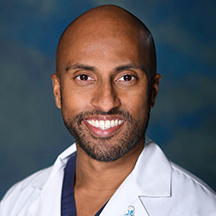
Walavan Sivakumar, MD, is a fellowship-trained and board-certified neurosurgeon specializing in complex cranial surgery, with a focus on minimally invasive and endoscopic techniques. He provides treatment for tumors of the brain, skull-base, and pituitary in addition to cerebral aneurysms, arteriovenous malformations and carotid stenosis. He employs the “keyhole” technique, utilizing advanced technology and microsurgical techniques to minimize collateral damage to the brain.
About Dr. Courtney Voelker

Courtney Voekler, MD, PhD (DPhil Oxon.), is a Rhodes Scholar and board certified neurotologist and cochlear implant surgeon who takes care of adult and pediatric patients seeing a wide range of inner ear and skull base conditions. She developed PNI’s enhanced treatment protocol for the treatment of acoustic neuromas. For qualified patients who suffer hearing loss before or after surgery, a cochlear implant may be placed in the affected ear to restore hearing at the time of tumor removal—a unique feature offered at few institutions.
About Dr. Kirsty Bortnik

Kirsty E. Bortnik, PhD, ABPP-CN, is a clinical neuropsychologist who focuses on adult and geriatric neuropsychological assessment. She has an extensive clinical background in the neuropsychology of various neurological conditions, with specialty training in epilepsy, movement disorders, and aging and dementia.
About Molly Rapozo

Molly Rapozo, MS, RDN, is a Registered Dietician Nutritionist and Brain Health Coach at Pacific Brain Health Center. She provides coaching for clinical research trials, and works with patients who receive treatment with medical specialists at the center. An avid meal planner and cook, Molly enjoys teaching people how to make good nutrition easy to do and delicious to eat. She also provides support and accountability with sleep, stress management and exercise.
Learn more about protecting your brain health
If you are interested in learning more about brain health and healthy aging, visit PNI’s Precision Brain Health program and Brain Wellness & Lifestyle program. We are dedicated to optimizing your brain health across the lifespan.
Useful Links
- Precision Brain Health
- Brain Wellness & Lifestyle Program
- Pacific Brain Health Center
- Dementia
- Alzheimer’s Disease
- Mild Cognitive Impairment (MCI)
About the Author
PNI Experts
Last updated: July 18th, 2024
